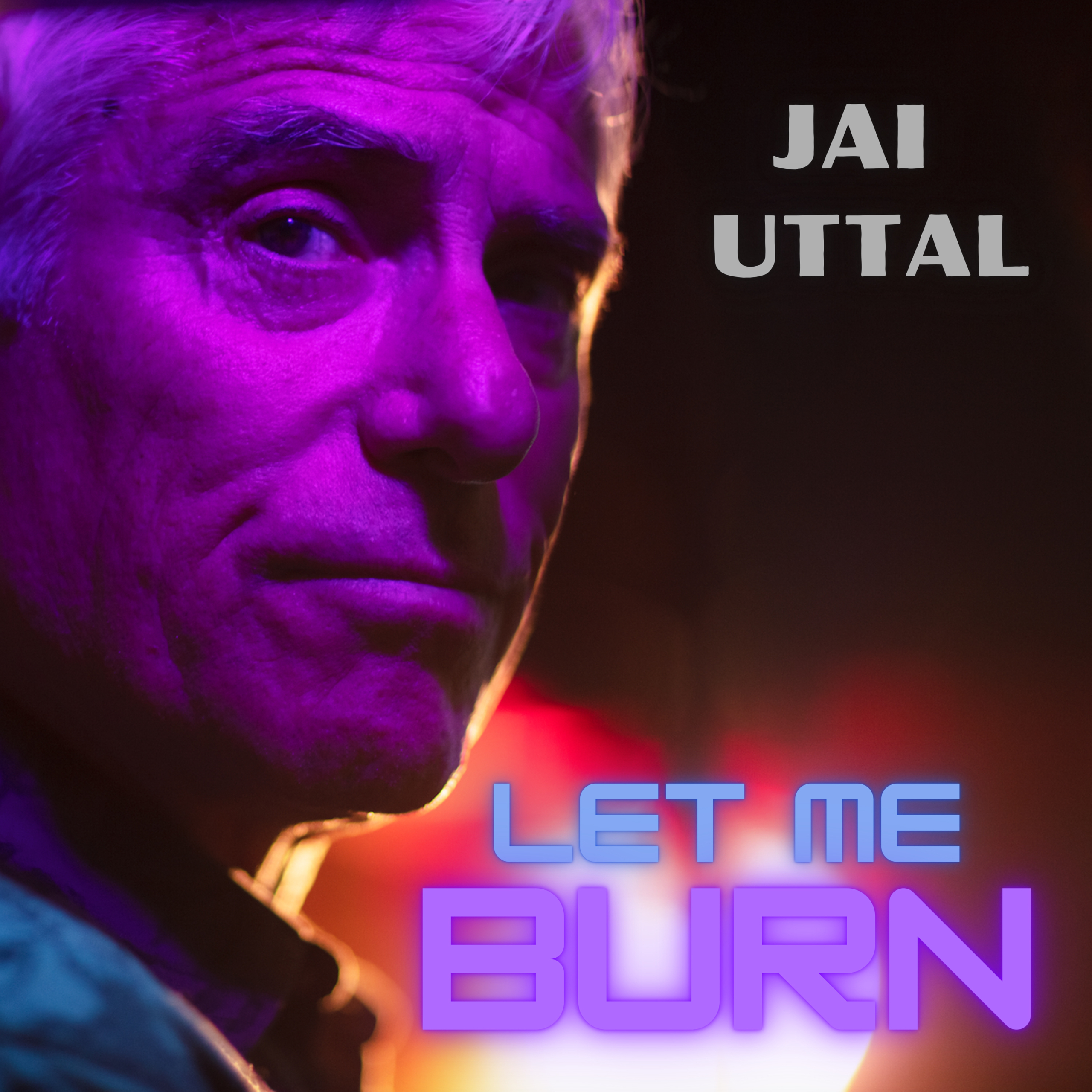Album From Jai Uttal: LET ME BURN

List of Songs
Campfire Sri Ram 8:39
Ladder of Longing 8:39
Let Me Burn 7:51
Asato Ma 7:24
After The Fire (Shiva’s Lullaby) 13:28
LET ME BURN LINER NOTES
When the pandemic and subsequent global ‘lockdown’ occured in March, 2020, the entire world, quite understandably, went into panic mode. I was certainly not immune to this anxiety, being older with a lifetime of asthma and lung issues. Though I tried to reframe Corona as ‘Karuna Ma’, the Mother of Compassion, deep inside I was scared. I began singing beautiful, deep and VERY slow kirtans to bring calmness to myself and to others, and these long prayers helped me to regain equilibrium and, I believe, helped my many friends and fans as well.
Please click on the song titles below more to learn more about each song.
Sometime in the second month of ‘sheltering at home’, a very lively and happy melody for ‘Sri Ram Jaya Ram Jaya JayaRam’ just popped into my head, along with a jangly, Country & Western guitar part. And it lodged in my mind and heart and I just couldn’t stop singing it. I shared this song on so many livestreams and in the Online Kirtan Camps that we’ve been hosting for the last year and a half. At first I called it ‘Cowboy Sri Ram’ because it seemed to have a hint of the Old West. Gradually, however, I began to realize this melody was a gift, a bit of grace, an anthem of gentle, yet powerful, love. And, singing it, I imagined sitting around a campfire with beloved friends, sharing our joy, love and longing in songs and stories. Now, with the addition of Deva Premal and Miten’s transcendent voices, I’m simply calling it ‘Campfire Sri Ram’.
SRI RAM JAYA RAM JAYA JAYA RAM!
Victory to Ram, the infinite God, within all form and beyond all form, who appears eternally in the luminous blue body of Sri Ramachandra; and victory to the Divine Mother of the Universe, Sita Devi, who appears eternally as Rama’s beloved wife, Sita, the Daughter of the Earth!
“Place the name of Rama as a jeweled lamp at the door of your lips and there will be light, both inside and out.”
~ Sri Ramacharitmanas by Tulsi Das
Credits:
Jai Uttal – Vocals, acoustic Guitar.
Joby Baker – Drums, Upright Bass, Electric Guitar, Hammond B3,
Piano, Backing vocals, Whistle.
Deva Premal and Miten – guest vocals
Sunniva Brynnel – Accordion
Jeff Cressman – Trombone
Recorded and mixed by Joby Baker
Additional recording by Ben Leinbach and Jeff Cressman
Upon reaching Mt. Sinai, the light was fading and the patriarch, Jacob, lay down to sleep. Putting a rock under his head, the ancient holy man rested and offered his consciousness to the divine spirit. In his dream state, Jacob saw a ladder connecting Earth to Heaven, and climbing up and down this ladder were angels of all types, sizes and energies. Descending the ladder were angels of compassion, bodhisattvas, who left the bliss of God’s presence to come to help the many souls lost in suffering and illusion. Ascending the mystical ladder were the angels of salvation, helping and encouraging the souls desperately struggling to reach the realms of purity and light. Singing the holy names, we sense a bejeweled ladder, shimmering with colors, calling us to climb its rungs of light. At first we shyly step up to the first rung, not sure if we are ready to take the step. But then our hearts break with love and longing, and we simply climb and climb, our passionate yearning expanding along with our ever increasing love. This is the Ladder of Longing!
HARE KRISHNA HARE KRISHNA KRISHNA KRISHNA HARE
HARE HARE RAMA HARE RAMA RAMA RAMA HARE HARE
Credits:
Jai Uttal – Banjo, Vocals
Adrian Dolan – Violin, Viola
Richard Moody – Violin, Viola
Joby Baker – Drums, Upright Bass, Wurlitzer, Electric Guitar,
Prophet 12, Tandmandal/Tambura, Congas, Small Percussion,
Vocals, String arrangement.
Ben Leinbach : Recording Engineer
Joby Baker : Recording Engineer, Mixed and Mastered at Baker
Studios.
In the great Indian epic, The Ramayana, Sita, the Divine Goddess, is abducted by the ten-headed king of the Demons,Ravana, and held captive in his palace on Lanka Island. Separated from each other, both Sita and her beloved Rama experience the deepest anguish of longing for each other, their pain almost paralyzing them. Finally, through the help of Hanuman, the monkey god, Shiva incarnate, Ravana and his armies are defeated and Rama and Sita can finally be reunited.But, the moment before this reunion, there was a murmuring inthe crowd and in the heart of Rama. Had Sita been faithful to him over all these months? Did she give in to Ravana’s demands? Sensing these doubts, Sita calls upon Agni, the god of fire, to manifest a great conflagration of flames, and she says in a loud voice, “If I have been unfaithful to my beloved in thought, word or deed, even in a dream, may these flames consume me, LET ME BURN!” Sita enters the fire and emerges unscathed, radiant, falling into Rama’s waiting arms, as all present sing SRI RAM JAY RAM JAY JAY RAM OM! Victory to Goddess and to God! We are all asked, every day, every minute, to look inside of ourselves and reaffirm the purity of our hearts, intentions and actions, and to step into the fire. May we all emerge, like Sita,shining in the radiance of love. And, as Sita was abducted by the King of Evil, we (and She!) sing this song for the countless milIons of women throughout history who have been taken into slavery, tortured and murdered. May grace, respect and equality return to this Earth! This song was composed for a theatrical opera based on the Ramayana, entitled ‘Sita Ram’. Co-written with David Kersnar of the Lookingglass Theater and performed by the Chicago Children’s Choir, ‘Sita Ram’ was one of the most wonderful projects I’ve had the privilege to be part of. And hats off to the amazing choir artistic director, Josephine Lee!
OM AH HUM VAJRA GURU PEDME SIDDHI HUM!
OM MANI PEDME HUM HRI!
Being without you love
I lost my dreams I lost my way
I only want to be your shadow
But now you’re close to me
I long to hold you in my arms
Just pull the string I’ll be your arrow.
I would walk through the fire for you
Burn till the night is through
All I ever wanted was to be your love
I would never betray you
LET ME BURN!
So long I’ve waited for
Your touch your breath your kiss my love
I’m lost in emptiness and sorrow
My heart cannot exist
Without you beating deep inside
I cannot stand to face tomorrow.
I would walk through the fire for you
Burn till the night is through
All I ever wanted was to be your love
I would never betray you
LET ME BURN!
SRI RAM JAY RAM JAY JAY RAM OM!
Credits:
Jai Uttal – vocal and guitars
Chicago Children’s Choir:
Josephine Lee – Artistic Director
Josephine Lee, Nick Feder, Timothy Fett, Nora V. Richards,
Mitchell Owens, Jacqueline Meadow, Samantha Bakall, Adriana
Flocco – vocals
Peter Apfelbaum – drum kit
Bhima Karma V. Saragrahi – mridanga
Gary Brown – Bass
Manose – bansuri flute
Produced by Jai Uttal and Ben Leinbach
Engineered and mixed by Ben Leinbach
A note about the Chicago Children’s Choir:
Founded in 1956, Chicago Children’s Choir is a multiracial,
multicultural choral music education organization, shaping the
future by making a difference in the lives of children and youth
through musical excellence. www.ccchoir.org
The Pavamana Mantra (pavamāna means: “being purified, strained”, historically a name of Soma), is an ancient Indian mantra introduced in the Bṛhadāraṇyaka Upaniṣad. Composed in about 700 BCE, this Upanishadic text is considered to be a treatise on the ‘Atman’ or soul. The mantra was originally meant
to be recited during the introductory praise of the Soma sacrifice. For the Bhakta, this prayer is a desperate plea to the Guru for salvation; an anguished request to extricate us from the pain of mundane existence.
The text of the mantra reads:
asato mā sadgamaya,
tamaso mā jyotirgamaya,
mṛtyor mā’mṛtaṃ gamaya.
This translates to:
From the unreal lead me to the real,
From darkness lead me to the light,
From death lead me to immortality.
oṃ śāntiḥ śāntiḥ śāntiḥ,
om peace peace peace
Jay Guru Dev Jay Jay Guru Dev
Credits:
Composed by Jai Uttal
Jai Uttal – Voice, Guitar, Keys.
Lucía Lilikoi – Voice, Keys, Percussion, Beats, Bass, Singing
Bowls.
Jeff Cressman – Trombone.
Madhu Anziani – Backing vocals.
Produced by Lucía Lilikoi and Jai Uttal
Recorded and engineered by Lucía Lilikoi
Mixed by Lucía Lilikoi and Ben Leinbach
Concealed in the vast glaciers of Mount Kailash, after the fires of
destruction, even Lord Shiva sleeps. With Mahadev’s head in
Parvati Devi’s lap, dreadlocks askew, the divine Goddess intones
to her beloved the sacred five syllable mantra ‘Na Ma Shi Va Ya’,
and peace shrouds the universes.
OM NAMAH SHIVAYA
Credits:
Jai Uttal : vocal, harmonium & guitar
Ben Leinbach : keyboards, engineering and mixing
All songs composed by Jai Uttal (Pavana Suta Music/BMI)2021
except: Let Me Burn, composed by Jai Uttal and David Kersnar
(Pavana Suta Music/BMI & David Kersnar/BMI)
Mastered by Reuben Lurrsen at Lurrsen Mastering, Inc.
Album photo by Jeffery Newbury.
Graphic design by Ratika Rebecca Gray at
sublimedesigncreative.com
A tranquil mood of quiet introspection pervades the five tracks that make up Let Me Burn, the new digital album from world music trailblazer Jai Uttal. These songs were forged in the crucible of the crippling COVID-19 pandemic that gripped the globe for most of 2020 and well into 2021. But, with characteristic mastery, Jai has transformed that experience into something truly beautiful—a healing, meditative musical retreat.
“This album was really birthed in the pandemic,” he says. “There were a lot of different moods that came through at that time. But there was a real effort, I would say, from me, my wife Nubia and son Ezra not to get isolated. The world was shutting down and people around us were shutting down. But I said, in this time of lockdown, let’s not lock down our hearts.”
As a result, Let Me Burn is a richly collaborative work, with contributions from mantra music icons Deva Premal and Miten, bansuri flute virtuoso Manose, singer/songwriter Lucia Lilikoi, the Chicago Children’s Choir and producer/multi-instrumentalists Ben Leinbach and Joby Baker. Nearly all the collaboration was done remotely, but physical isolation only served to strengthen the heartfelt bond among the musicians and singers.
“I started working with people on these songs without really knowing what I was going to do with them,” Jai recounts. “And my wife said, ‘Why not release these songs as an album in celebration of your 70th birthday on June 12? This birthday is a major milestone. So let’s mark it.’”
As the world struggled with COVID and widespread political turmoil, Jai faced his own set of personal challenges. No longer able to perform live, his income was impacted. And as a lifelong asthmatic soon to turn 70, he was among those most at risk from COVID. Meanwhile forest fires raged throughout the area of Northern California where the artist and his family have lived for years. But by far the most formidable challenge was the double fusion lumbar spine surgery Jai underwent in February of this year to correct what had become a debilitatingly painful back condition.
Adversity, however, can be the handmaiden of both wisdom and profound artistic beauty. For confirmation of this one need look no further than the track that opens Let Me Burn, the wistful, elegiac waltz-time “Campfire Sri Ram,” featuring Deva Premal and Miten.
“I love those guys and we go back a long way together,” Jai says of the duo. “We worked hard to get the mood of this song just right. It’s a joyful melody, but there’s an undercurrent of poignancy that I think we were able to capture. Our collaborations are always filled with love. We’re fans of one another and good friends at the same time.”
A hypnotic ostinato on banjo—Jai’s first instrument—anchors the album’s second track, the gently percussive, delicately evocative “Ladder of Longing.” A setting of the timeless Hare Krishna mantra, the composition started out as a simple iPhone demo that Jai sent to producer Joby Baker, who bejeweled it with gemlike instrumental colors and a plaintive string arrangement. “I had a real immersion in the banjo during the pandemic,” Jai says. “I started taking lessons online, and I’m still taking them. Banjo was my first love, but it was in the background for a long time.”
Nestled at the very heart of the album—the third of five compositions—is the record’s title track and, in many ways, its keynote song. Although, ironically, “Let Me Burn” is the one piece on the album that wasn’t written and recorded during the pandemic. It’s an outtake from Jai’s 2009 album Thunder Love that had begun life as part of an opera—a theatrical setting of the ancient Hindu epic, The Ramayana—that Jai had co-written for the Chicago Children’s Choir.
“It was completely forgotten,” Jai says. “Just some old sound file. I found it and said, ‘This is great! Why didn’t we put it on Thunder Love?’ It’s so emotive. Maybe it was too emotional for Thunder Love, but it seemed to fit the mood of the pandemic. I felt like the world was burning. With the isolation, people were living with such fear, paranoia and financial insecurity. I just had this sense of burning. So what’s burning? You have to burn away karma, burn away negativity, burn away the husks of the heart.”
Fittingly, this song is followed by a purification mantra. “Asatoma” is a setting of the ancient Pavamana Mantra, featuring the singer/songwriter Lucía Lilikoi , a near neighbor and friend of Jai’s.
“I met Lucía because she was a yoga student of my wife, Nubia’s,” Jai recounts. “They became friends and, through that, we became friends. She’s a beautiful singer and we’ve done a bunch of gigs together. She was just getting her home studio together and I don’t have a home studio of my own, so I called her and said, “I have this song. Let’s make an experiment and work on it together. And of course it’s a very powerful prayer—an ancient, ancient prayer.”
The album strikes a deeply introspective final chord with “After the Fire (Shiva’s Lullaby).” Against a simple backdrop of droning harmonium and keyboards, along with Jai’s soulful acoustic guitar improvisations, he intones a guru mantra that is a deeply personal part of his life and spiritual practice.
“When I recorded the track at Ben Leinbach’s studio, I just sang the guru prayers, called the guru shlokas, before going into the main chant. Even as I was singing, I thought, ‘We’ll just cut that out later.’ But that Sanskrit prayer is very meaningful to me. It’s one that I sing as part of my own daily practice. And for nearly every concert I’ve given—whether it’s live-stream or in person—I always start with those prayers, often with different melodies. I’ve sung them on a few of my albums too. But on ‘Shiva’s Lullaby,’ I even sing my guru’s name at the end of the track. I’ve never put that on a recording before.”
On his 70th birthday, with the world gradually emerging from lockdown, Jai Uttal took a pleasant stroll along a Northern California beach. He was still in recovery from his back surgery, but nearly pain-free for the first time in years. “That was my goal in getting through the surgery, which was terrifying,” he says. “Nothing really cosmic, just ‘I hope when I come out of this surgery I can take a good walk on the beach without pain.’ And on my birthday I was able to do that.”
Let Me Burn is the 21st album in Jai Uttal’s prolific and profoundly innovative body of recorded work. Coming at a moment of synchronicity in his own life and the evolution of our planet, it marks another milestone in the career of an artist who has always pushed musical boundaries by following the simple truths of his heart.
“Looking back as a 70-year-old, I’m very very proud of all the work that I’ve done,” he says. “I feel like I’ve been blessed to have created real beauty. And I hope that this album brings a sense of joy and renewal after all the chaos we’ve been through—like a big, deep breath. For myself, I feel a lot of hope. There’s a lot more inspiration and a lot more creative work to come.”
LET ME BURN, The 70th Birthday Album from World Devotional Music Innovator Jai Uttal is a Balm for Post-Pandemic Stress.


